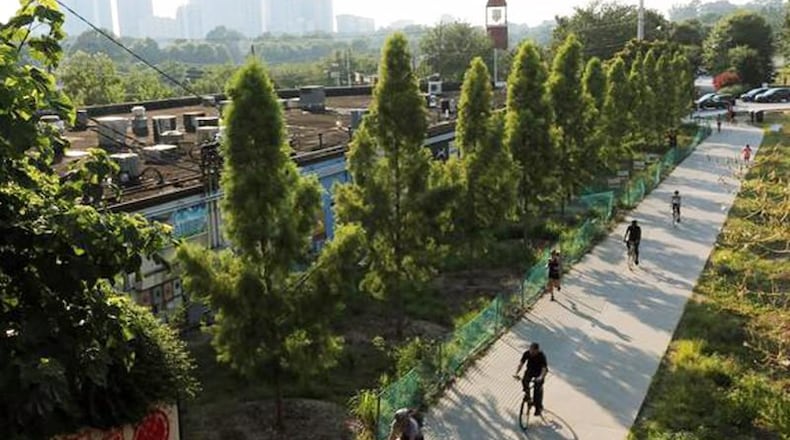Cathy Woolard spent a lot of time talking about transportation when she was campaigning for mayor.
Now she hopes to keep the conversation going by inspiring a grassroots effort focused on light rail transit around the Atlanta Beltline.
Woolard and Gravel remain good friends having both worked on the project from the start. The vision, she said, was always that transit would be as integral to the project as anything else. But lately, that seems to have fallen to a low priority.
More than a year ago, Atlanta voters approved a half-penny sales tax to raise $2.5 billion for transit, yet there has been no discussion about how that money will impact Beltline transit. Woolard created the group Beltine Rail Now! to keep the transit plan for the Beltline at the forefront.
“What we are trying to do is provide information and empower people to go forward and organize their grassroots effort. That is how the Beltline got built in the first place,” said Woolard by phone.
The group has grown to just over 800 members. On Sunday, the fourth meeting takes place from 4 - 5 p.m. at 8arm, 710 Ponce de Leon Ave NE. Woolard said they will be approving a logo and signing on businesses and neighborhood groups in support of the project. After the meeting, members often break into smaller groups to continue discussing action plans, she said.
Related: Residents unhappy with proposed development at Piedmont Park, Atlanta Beltline
Though Woolard is the administrator for the group on social media, she makes it clear that the structure is flat. Anyone who has a good idea can present it for vote. As the group continues to grow, the meeting locations will travel around town to make sure they are reaching all neighborhoods, Woolard said. Everyone is welcome, from Beltline experts to those who know nothing at all.
Woolard believes the lack of attention given to Beltline transit is an issue mostly of leadership and priority. “Obviously money is an obstacle but we spent $100 million on the (Atlanta) streetcar and studies indicated at the very beginning that there wasn’t enough ridership to support it,” she said.
On July 1, MARTA assumes operations of the Atlanta Streetcar formerly operated by the City of Atlanta which makes a 2.7-mile loop of downtown Atlanta. Problems wth the project included a 60 percent drop in ridership when the city began charging $1 per ride. MARTA has indicated it will use funds from the half-penny sales tax for MARTA approved by Atlanta voters in November to operate the streetcar.
Woolard said the time is now to lobby for Beltline transit.
“We can’t really grow our way out of this gridlock. Most urban areas that have implemented streetcars and light rail in an existing urban environment have to do so by taking right of way or lanes out of existing streets but to have a 22-mile loop of right of way that is for the most part not mingling with traffic and completely available to us is an outrageously great resource we should not want to waste,” Woolard said.
The cautionary tale is to be sure that certain points of the Beltline that have yet to be developed are not developed in a manner that constrains the options for a rail system.
“I don’t want the Beltline to be a ring of bars, a 22-mile pub crawl,” Woolard said.
Atlanta BeltLine, Inc. recently introduced a survey to gauge community perceptions, expectations and improvements for the Beltline. Questions about a possible rail system on the Beltline include the likelihood of use and a priority ranking.
About the Author
Keep Reading
The Latest
Featured



